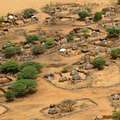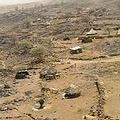 受害者、人權團體與法律專家聯合向國際刑事法庭呼籲,應起訴蘇丹官方惡意破壞環境、迫使達佛居民遷離的犯罪行為。達佛難民控訴,政府除下令恐嚇與集體屠殺,並指示結盟的阿拉伯民兵(Janjaweed)焚毀農地、污染水源,以逐離當地黑人農民與市民。
受害者、人權團體與法律專家聯合向國際刑事法庭呼籲,應起訴蘇丹官方惡意破壞環境、迫使達佛居民遷離的犯罪行為。達佛難民控訴,政府除下令恐嚇與集體屠殺,並指示結盟的阿拉伯民兵(Janjaweed)焚毀農地、污染水源,以逐離當地黑人農民與市民。
今年6月,聯合國秘書長潘基文曾發表一席帶有爭議的談話,突顯環境問題在達佛衝突中的敏感地位。他認為達佛危機並非單純起因於阿拉伯民兵與黑人游擊隊及農民間的種族紛爭,而是由生態危機所引發,其中至少有部份源自氣候變遷。
但達佛的境內流徙難民(IDP)擔憂,此觀點可能淡化了政府為驅逐居民而摧毀糧食飲水資源的罪行。
由達佛北部愛法許(El Fashir)地區逃出的卡里爾(Khalil)表示,聯合國秘書長採取的態度,會讓蘇丹政府指示阿拉伯民兵破壞環境的行為得以脫罪。
他說,蘇丹政府以為,「只要焚燒村莊、毀壞樹木並使飲水短缺,就能迫使住民因飢渴而遷離,讓阿拉伯民兵佔駐。」
同樣來自愛法許的難民亞瑟(Yasir)則說,蘇丹政府為了強迫他們離開而燒燬田地,「國際刑事法庭理應調查這類犯罪行為。」
聯合國曾於2005年3月請求國際法庭對達佛的情況進行調查,但檢察官只詢問過蘇丹境外難民營中的受害者,因為政府拒絕合作,並否認指使該地區的嚴重犯罪。
儘管亞瑟等難民指證歷歷,國際法庭至今仍未對達佛危機中惡意的環境破壞,做出任何相關起訴。
另一方面,哥倫比亞大學地球學會(Earth Institute)主任與聯合國顧問薩克斯(Jefferey Sachs)曾在受訪時提出,達佛環境遭受破壞的元兇,是長期以來降雨量減少,這「可能源自人為氣候變遷,即主要肇因於富裕國家排放的溫室氣體」。
他表示,該地區極待擬定發展方針,並需國際經援幫助落實,「即使和平降臨,達佛仍然會是世界上最貧苦艱困之處。」
 Victims, pressure groups and legal experts want the International Criminal Court to charge Sudanese officials with environmental crimes which they say contributed to the mass displacement of Darfur civilians. In addition to ordering their campaign of terror and mass killings, the government instructed its allied Arab Janjaweed militia to drive out black farmers and civilians by burning fields and contaminating water supplies, claim refugees.
Victims, pressure groups and legal experts want the International Criminal Court to charge Sudanese officials with environmental crimes which they say contributed to the mass displacement of Darfur civilians. In addition to ordering their campaign of terror and mass killings, the government instructed its allied Arab Janjaweed militia to drive out black farmers and civilians by burning fields and contaminating water supplies, claim refugees.
The role the environment had in the Darfur conflict was raised controversially in June by United Nations Secretary General Ban Ki-Moon, who said the causes of the crisis were more complex than an ethnic dispute between Arab militias and black rebels and farmers. He argued that it began with an ecological crisis, arising, at least in part, from climate change.
But Darfur's internally displaced people, IDPs, say such arguments risk masking the guilt of government officials who drove people from their homes by destroying their food and water sources.
Khalil, an IDP in the El Fashir region of north Darfur, said the position taken by the secretary-general allowed the Sudanese government to escape the blame for environmental crimes committed by the allied Janjaweed militia.
He said the Sudanese government thought that "if they burn villages, destroy trees and make water shortages, the people will move away because of hunger and thirst to make way for the Arabs."
Yasir, from a camp in El Fashir, said the Sudanese government was forcing people out by burning their crops, and that "the International Criminal Court should investigate this kind of crime."
The UN asked the International Criminal Court to investigate Darfur in March 2005, and since then prosecutors have been questioning victims in refugee camps outside Sudan, because the government refuses to cooperate with the court or recognize its jurisdiction over serious crimes in the region.
Despite evidence like Yasir's testimony, the ICC has yet to press charges related to deliberate environmental destruction against anyone over the Darfur crisis.
However, Jeffrey Sachs, director of the Earth Institute at Columbia University and advisor to the UN, said in an interview that the biggest cause of damage to the Darfur environment was a long-term decline in rainfall, which is "probably due to anthropogenic climate change, caused largely by rich-country greenhouse gas emissions."
He said the region desperately needs a development strategy and international financial support to implement it. "Even with peace, it will remain one of the very poorest and most desperate places on the planet," Sachs said.
全文及圖片詳見 ENS


